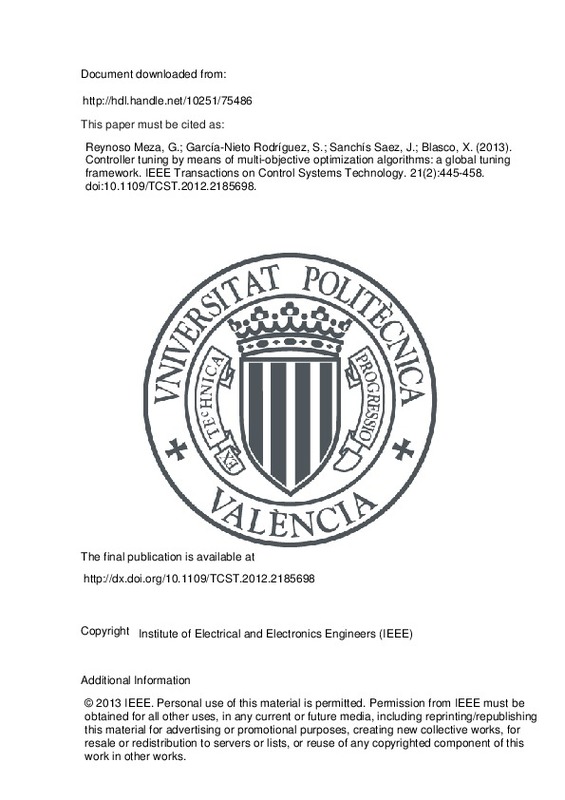Reynoso Meza, G.; García-Nieto Rodríguez, S.; Sanchís Saez, J.; Blasco, X. (2013). Controller tuning by means of multi-objective optimization algorithms: a global tuning framework. IEEE Transactions on Control Systems Technology. 21(2):445-458. https://doi.org/10.1109/TCST.2012.2185698
Por favor, use este identificador para citar o enlazar este ítem: http://hdl.handle.net/10251/75486
|
Título:
|
Controller tuning by means of multi-objective optimization algorithms: a global tuning framework
|
|
Autor:
|
Reynoso Meza, Gilberto

 García-Nieto Rodríguez, Sergio
García-Nieto Rodríguez, Sergio

 Sanchís Saez, Javier
Sanchís Saez, Javier

 Blasco, Xavier
Blasco, Xavier
|
|
Entidad UPV:
|
Universitat Politècnica de València. Instituto Universitario de Automática e Informática Industrial - Institut Universitari d'Automàtica i Informàtica Industrial
Universitat Politècnica de València. Escuela Técnica Superior de Ingenieros Industriales - Escola Tècnica Superior d'Enginyers Industrials
Universitat Politècnica de València. Escuela Técnica Superior de Ingeniería del Diseño - Escola Tècnica Superior d'Enginyeria del Disseny
Universitat Politècnica de València. Departamento de Ingeniería de Sistemas y Automática - Departament d'Enginyeria de Sistemes i Automàtica
|
|
Fecha difusión:
|
|
|
Resumen:
|
A holistic multi-objective optimization design technique for controller tuning is presented. This approach gives control engineers greater flexibility to select a controller that matches their specifications. Furthermore, ...[+]
A holistic multi-objective optimization design technique for controller tuning is presented. This approach gives control engineers greater flexibility to select a controller that matches their specifications. Furthermore, for a given controller it is simple to analyze the tradeoff achieved between conflicting objectives. By using the multi-objective design technique it is also possible to perform a global comparison between different control strategies in a simple and robust way. This approach thereby enables an analysis to be made of whether a preference for a certain control technique is justified. This proposal is evaluated and validated in a nonlinear multiple-input multiple-output system using two control strategies: a classical proportional- integral-derivative control scheme and a feedback state controller.
[-]
|
|
Palabras clave:
|
Controller tuning
,
Decision making
,
Evolutionary algorithm
,
Multiobjective optimization
,
Proportional-integral-derivative (PID) tuning
|
|
Derechos de uso:
|
Reserva de todos los derechos
|
|
Fuente:
|
IEEE Transactions on Control Systems Technology. (issn:
1063-6536
) (eissn:
1558-0865
)
|
|
DOI:
|
10.1109/TCST.2012.2185698
|
|
Editorial:
|
Institute of Electrical and Electronics Engineers (IEEE)
|
|
Versión del editor:
|
http://dx.doi.org/10.1109/TCST.2012.2185698
|
|
Código del Proyecto:
|
info:eu-repo/grantAgreement/UPV//FPI-2010-19/
info:eu-repo/grantAgreement/UPV//PAID-06-11/
info:eu-repo/grantAgreement/MICINN//DPI2008-02133/ES/NUEVAS ESTRATEGIAS DE OPTIMIZACION MULTIOBJETIVO PARA LA IDENTIFICACION, CONTROL Y DISEÑO DE PROCESOS Y SISTEMAS/
info:eu-repo/grantAgreement/MICINN//TIN2011-28082/ES/DISEÑO E IMPLEMENTACION DE PILOTOS AUTOMATICOS PARA VEHICULOS AEREOS NO TRIPULADOS (UAVS) MEDIANTE TECNICAS DE OPTIMIZACION Y CONTROL AVANZADO/
info:eu-repo/grantAgreement/MICINN//ENE2011-25900/ES/GESTION OPTIMA MEDIANTE CONTROLADORES AVANZADOS DE PILAS DE COMBUSTIBLE TIPO PEM PARA APLICACIONES MOVILES Y ESTATICAS/
|
|
Descripción:
|
© 2013 IEEE. Personal use of this material is permitted. Permission from IEEE must be obtained for all other uses, in any current or future media, including reprinting/republishing this material for advertising or promotional purposes, creating new collective works, for resale or redistribution to servers or lists, or reuse of any copyrighted component of this work in other works.
|
|
Agradecimientos:
|
This work was supported in part by the FPI-2010/19 Grant and the Project PAID-06-11 from the Universitat Politecnica de Valencia and in part by the Projects DPI2008-02133, TIN2011-28082, and ENE2011-25900 from the Spanish ...[+]
This work was supported in part by the FPI-2010/19 Grant and the Project PAID-06-11 from the Universitat Politecnica de Valencia and in part by the Projects DPI2008-02133, TIN2011-28082, and ENE2011-25900 from the Spanish Ministry of Science and Innovation.
[-]
|
|
Tipo:
|
Artículo
|







![[Cerrado]](/themes/UPV/images/candado.png)


